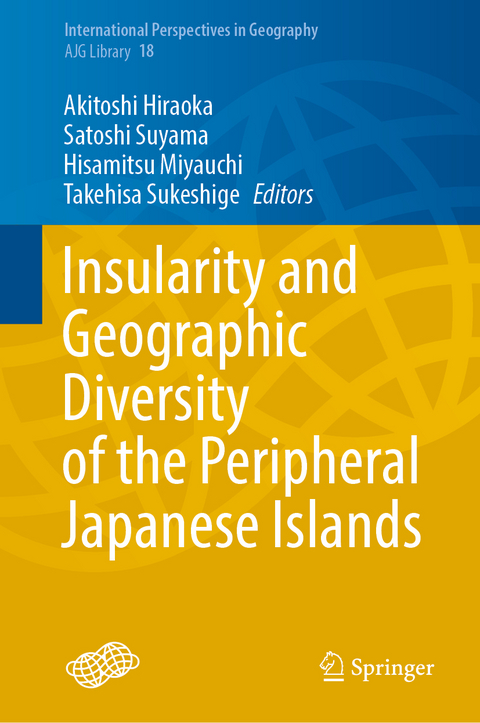
Insularity and Geographic Diversity of the Peripheral Japanese Islands
Springer Verlag, Singapore
978-981-19-2315-9 (ISBN)
Dr. Akitoshi Hiraoka was born in Hiroshima Prefecture, Japan. He is a professor emeritus at Shimonoseki City University, Japan, and a founder of the Research Group on Island Regions of the Association of Japanese Geographers. He has been studying Japanese islands for more than 50 years. He especially focused on islands in Western Japan, such as the islands in the Seto Inland Sea, the Kyushu area, and Okinawa. In the course of these studies, he revealed that the Japanese advance into the South Sea was initiated and developed for the purpose of catching albatrosses (Japanese Advance into the Pacific Ocean, English version published by Springer). He received several Geographical Society Awards for this study.Dr. Satoshi Suyama was born in Toyama Prefecture, Central Japan, which has the fewest islands among Japanese coastal prefectures. He is a professor at the Department of Geography, Komazawa University, Japan, and a member of the Research Group on Island Regions of the Association of Japanese Geographers. He has served as the vice president of the Japan Society of Island Studies since 2019. He specializes in human geography, especially in landscape studies and regional promotion. His research focuses on remote island regions. He has been working in the Amami Archipelago in the Nansei Islands of Japan for more than 20 years and has been appointed as the Amami tourism ambassador since 2012. He dreams of living in Amami after retirement. Dr. Hisamitsu Miyauchi was born in Toyama Prefecture, Japan. He is a professor of the Faculty of Global and Regional Studies at the University of the Ryukyus, Japan, where he served as the vice dean of the Graduate School of Humanities and Social Sciences. He is a member of the Research Group on Island Regions of the Association of Japanese Geographers. He holds a Ph.D. in humanities from Hiroshima University, Japan. His main research interests include the transformation of social space on Japanese islands and population migration from the Ryukyu Islands. He has authored or co-authored over 50 book chapters and journal articles on island geography or migration studies, many of which are peer-reviewed. He is a visiting professor at the Center for Spatial Information Science (CSIS), the University of Tokyo. He is also the chief editor of the Okinawa Journal of Geographical Studies and Immigration Studies. Takehisa Sukeshige was born in Tokyo, but his ancestors lived on Suo-oshima Island in the Seto Inland Sea. He is a professor of the Department of Contemporary Sociology at Toyama University of International Studies, Japan, and a member of the Research Group on Island Regions of the Association of Japanese Geographers. He specializes in human geography, especially in regional development of remote islands and farming villages in peripheral regions of Japan. The main study areas include the Tsushima Islands in Nagasaki Prefecture, the Miyako Islands in Okinawa Prefecture, andTeshikaga-cho in Hokkaido.
Cultural and Social Overview of Japanese Islands.- Conventional Studies of Japanese Islands.- Positioning of Islands in Modern Japan.- Population Flow from/to the Islands.- Natural Hazard and Island Inhabitants.- Life Space on Islands.- Production Space on Islands.- Tourism Development in Islands.- Conclusion.
| Erscheinungsdatum | 13.06.2022 |
|---|---|
| Reihe/Serie | International Perspectives in Geography ; 18 |
| Zusatzinfo | 54 Illustrations, color; 15 Illustrations, black and white; XVIII, 261 p. 69 illus., 54 illus. in color. |
| Verlagsort | Singapore |
| Sprache | englisch |
| Maße | 155 x 235 mm |
| Themenwelt | Naturwissenschaften ► Geowissenschaften ► Geografie / Kartografie |
| Sozialwissenschaften ► Soziologie | |
| Schlagworte | Human geography • Japanese islands • Periphery of Japan • Population • Tourism |
| ISBN-10 | 981-19-2315-9 / 9811923159 |
| ISBN-13 | 978-981-19-2315-9 / 9789811923159 |
| Zustand | Neuware |
| Informationen gemäß Produktsicherheitsverordnung (GPSR) | |
| Haben Sie eine Frage zum Produkt? |
aus dem Bereich


